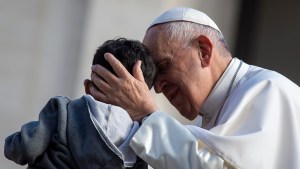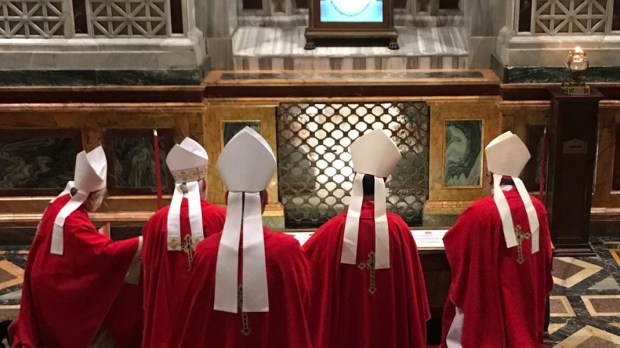I write these words on the airplane taking me home from my first visit as a bishop ad limina apostolorum (to the threshold of the apostles). This is the pilgrimage, required by canon law of every bishop, to pray at the tombs of St. Peter and St. Paul and to meet personally with the Successor of Peter. In an earlier column, I wrote of the extraordinary visit to the tomb of Peter and an even more extraordinary conversation with the Galilean fisherman’s successor, Pope Francis.
As I head home, I want to reflect on the sojourn I made with my fellow bishops of Region 11 to the tomb of St. Paul, an encounter that moved me even more than I thought it would.
Paul’s sarcophagus is situated in the heart of the magnificent Basilica of St. Paul Outside the Walls, so called because it stands on a site beyond the city limits of ancient Rome. Tradition dictates that it was on or near this spot that Saul of Tarsus, transformed by Christ’s grace into the Apostle Paul, was beheaded for the crime of declaring the Lordship of Jesus. The decapitation by sword, by the way—a far easier manner of execution than crucifixion, being devoured by animals, or burned alive—was a privilege accorded to Paul on account of his Roman citizenship.
After Mass in the upper church, all of us bishops were ushered down to a lower section, called the confessio, and there we knelt in the very presence of the resting place of the great Apostle to the Gentiles. As I prayed on that spot, wearing the full liturgical regalia of a successor of the Apostles, I admit that I felt utterly, utterly inadequate. Who was I to be in any sense a “successor” of Paul?
But then I commenced to muse on the fact that Paul himself often felt unworthy of the task that had been entrusted to him. In a most telling and revealing text, Paul confesses that he was indeed an Apostle, since he had seen the Risen Lord, but that he did not deserve the title because he had persecuted the Church so violently. Elsewhere he admits that his speech and appearance are unimpressive and thus wonders why the Lord chose him precisely for a ministry of proclamation. In still another passage, Paul tells us that God had given him a “thorn in the flesh … to keep him from being proud.” Three times, he said, he begged the Lord to take it away. What was it? Nobody really knows. Could it have been a speech impediment, a chronic illness, a psychological debility, a spiritual weakness? In any case, Paul reports how the Lord responded to his prayer: “My grace is sufficient for you, for in weakness, power reaches perfection.” Therefore, Paul concludes, “I willingly boast of my weakness that the power of Christ might rest upon me.”
Paul realized that self-striving in the attempt to win the affection of a wrathful God is to get the spiritual life more or less backward
And what stands, of course, at the very heart of Paul’s teaching is the idea of the primacy of grace, God’s free gift. When he was a young man, filled, as he put it, with zeal for the tradition of his fathers, Saul/Paul thought that the rigorous fulfillment of the law of Israel would make him pleasing to God. And so he, by his own admission, outdid all of his contemporaries in the achievement of righteousness. But upon meeting the risen Jesus and reflecting on the meaning of the Lord’s death and Resurrection, Paul realized that self-striving in the attempt to win the affection of a wrathful God is to get the spiritual life more or less backward.
Rather, God in Christ goes to the very limits of godforsakenness in order to find those who wander far from him. By this incomparable and unexpected grace, we are saved, set right, “justified,” to use Paul’s favorite term for this state of affairs. To accept this grace in grateful faith is the beginning of a properly ordered spiritual life. The 20th-century theologian Paul Tillich summed this up as follows: “accepting the fact that you’ve been accepted, even though you’re unacceptable!”

Read more:
“If only I had died instead of you”: Pope Francis reflects on how God mourns us when we turn away
Now, once this move has taken place, we can turn everything in us over to the power of Christ so as to “increase our justification,” as the Council of Trent puts it. Paul didn’t abandon his zeal; rather, he gave it, transfigured by grace, to Christ—and it carried him to the ends of the world. He didn’t let go of his gifts of mind and heart; he offered them, transfigured by grace, to the Lord—and they continue to enliven the Church to this day. Moreover, he learned even to give his weakness and inadequacy to Jesus, once they had been caught up in grace, and the Lord has used them throughout the Christian centuries.
All of which brings me back to the moment when I knelt before the sarcophagus of Paul, feeling completely unworthy of the vestments I was wearing and the title of successor to the Apostles that I was bearing. Weaknesses? I’ve got plenty of them. Thorns in the flesh? You bet. Feelings of inadequacy? Of course. What came to me in that prayer at the confessio of Paul was the deep conviction that the spiritual life is not a matter of impressing God with my accomplishments. It is a matter, first and foremost, of accepting the fact that I’ve been accepted—and then giving to Christ all that is in me, both the strengths and the weaknesses, so that he might do with them as he pleases.
Read more:
Take care of God’s gift; that’s sanctity, says Pope Francis

